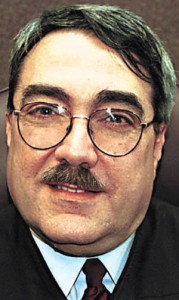The Second Amendment’s Second-Class Citizens — A history
From The Atlantic: Black citizens of the United States have seldom enjoyed the same right to bear arms that whites do. On social-media, many are already asking why the Second Amendment did not protect Alton Sterling and Philando Castile, and why gun-rights advocates like the National Rifle Association are not speaking out on their behalf. In each case, there are complicated legal questions, and many of the details remain unclear, but it is true that gun-rights groups like the NRA and its allies have typically pushed for laws that would allow citizens broader freedom to bear arms than currently permitted.
It is also the case that the interpretation of the Second Amendment has for decades been deeply intertwined with the ways the law protects—and more often fails to protect—African Americans in comparison with whites, a history that begins in earnest in the 1860s, flares up in the 1960s, and is again relevant today. (more)
US House bill salutes arrival of blacks in America
From the Winston-Salem Journal: A large group of U.S. House Democrats and four Republicans co-sponsored a bill passed by the U.S. House on July 6 aimed at commemorating something that happened almost 400 years ago.
In 1619, aboard a ship known as the White Lion, about 20 Africans arrived in Colonial America. The place was Point Comfort, now known as Fort Monroe in Hampton, Va. They were the first Africans to arrive. And like commodities, they were traded for food and supplies.
The bill, known as the “400 Years of African American History Act,” or H.R. 4539, would establish a commission charged with planning programs and activities in 2019, primarily through the U.S. National Park Service, highlighting the arrival and subsequent influence of Africans in America. The commission may provide grants to communities and nonprofit organizations for the development of programs, as well as to scholarly organizations to research, publish or distribute information relating to the arrival of Africans in the U.S., according to a summary of the bill.
Sixty-one Democrats signed on as co-sponsors. Among them were the three from North Carolina: Alma Adams, G.K. Butterfield and David Price.
“It’s time for our nation to commemorate the contributions and resilience African-Americans have made throughout history,” said Butterfield, chairman of the Congressional Black Caucus. (more)
Voices from the Invisible Diamonds
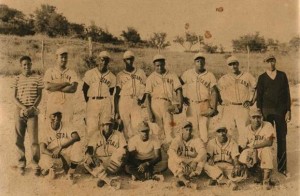 Former members of Texas’ Negro League baseball teams tell their stories in their own words Saturday, July 16, at the UT-San Antonio Institute of Texan Cultures. The program runs from 1:30-3:30 with special guest Damion Thomas, sports curator of the Smithsonian’s National Museum of African American Cultural and History.
Former members of Texas’ Negro League baseball teams tell their stories in their own words Saturday, July 16, at the UT-San Antonio Institute of Texan Cultures. The program runs from 1:30-3:30 with special guest Damion Thomas, sports curator of the Smithsonian’s National Museum of African American Cultural and History.
Following an initial lecture in the spring, the museum continues its baseball series by calling on former members of Negro League baseball teams to tell their stories in their own words. Players from the San Antonio and Kerrville areas are expected. Also on the program will be Layton Revel, PhD, founder and director of the Center for Negro League Baseball Research in Carollton, Texas, who also played a role in opening the Negro League Museum in Birmingham, Alabama.The roundtable discussion will conclude with opportunities for an audience question and answer session with the players and experts, followed by a meet & greet.
Standard museum admission will be waived from noon to 5 p.m.
PVAMU football great Clem Daniels highlights PVILCA Hall of Fame induction ceremonies, July 16
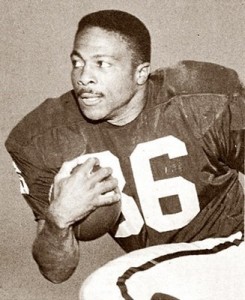 Clem Daniels, who starred as a running back at PVAMU and was a member of the Panthers’ 1958 Black College National Championship team, will be inducted to the Prairie View Interscholastic League Coaches Assn. Hall of Fame and Hall of Honor. The ceremonies are scheduled for 1:30 p.m. Saturday, July 16 at San Antonio’s Grand Hyatt Hotel, 600 Market Street.
Clem Daniels, who starred as a running back at PVAMU and was a member of the Panthers’ 1958 Black College National Championship team, will be inducted to the Prairie View Interscholastic League Coaches Assn. Hall of Fame and Hall of Honor. The ceremonies are scheduled for 1:30 p.m. Saturday, July 16 at San Antonio’s Grand Hyatt Hotel, 600 Market Street.
Daniels is a native of McKinney — north of Dallas — where he attended Doty High School, graduating in 1955. He was a two-time All-Pro with the Oakland Raiders during his nine-year career, including seven seasons with the Raiders. In 1963, Daniels was the The Sporting News American Football League Player of the Year. He was inducted into PV’s Sports Hall of Fame in 1989, and the California Black Athletic Hall of Fame in 1993.
TIPHC Bookshelf
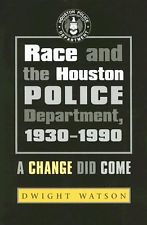 Published scholarship on black history in Texas is growing and we’d like to share with you some suggested readings, both current and past, from some of the preeminent history scholars in Texas and beyond. We invite you to take a look at our bookshelf page — including a featured selection — and check back as the list grows. A different selection will be featured each week. We welcome suggestions and reviews. This week, in light of current events, we offer, “Race and the Houston Police Department, 1930–1990, A Change Did Come,” by Dwight D. Watson.
Published scholarship on black history in Texas is growing and we’d like to share with you some suggested readings, both current and past, from some of the preeminent history scholars in Texas and beyond. We invite you to take a look at our bookshelf page — including a featured selection — and check back as the list grows. A different selection will be featured each week. We welcome suggestions and reviews. This week, in light of current events, we offer, “Race and the Houston Police Department, 1930–1990, A Change Did Come,” by Dwight D. Watson.
In Houston, as in the rest of the American South up until the 1950s, the police force reflected and enforced the segregation of the larger society. When the nation began to change in the 1950s and 1960s, this guardian of the status quo had to change, too. It was not designed to do so easily.
Dwight Watson traces how the Houston Police Department reacted to social, political, and institutional change over a fifty-year period—and specifically, how it responded to and in turn influenced racial change.
This Week In Texas Black History, July 10-16
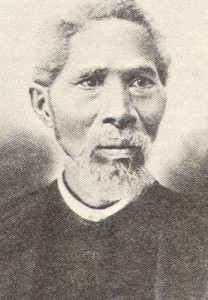 11 – On this day in 1828, Rev. John Henry “Jack” Yates was born into slavery in Gloucester County, Virginia. He moved with his wife (Harriet) and 11 children in 1863 when Harriet’s master relocated with his slaves to Matagorda County. Following emancipation in 1865, Yates moved his family to Houston where he began working with the Home Missionary Society and was ordained a Baptist minister. In 1866, after being ordained, Yates became the first pastor of Antioch Baptist Church, the first black Baptist church in Houston. Yates was also active in education, volunteering Antioch as the site for a Freedmen’s Bureau school and he also helped bring the first Baptist college to Texas, Bishop Academy, an institution that prepared students for employment in trades, business and ministry. Houston’s Jack Yates High School, built in 1926, is named in his honor.
11 – On this day in 1828, Rev. John Henry “Jack” Yates was born into slavery in Gloucester County, Virginia. He moved with his wife (Harriet) and 11 children in 1863 when Harriet’s master relocated with his slaves to Matagorda County. Following emancipation in 1865, Yates moved his family to Houston where he began working with the Home Missionary Society and was ordained a Baptist minister. In 1866, after being ordained, Yates became the first pastor of Antioch Baptist Church, the first black Baptist church in Houston. Yates was also active in education, volunteering Antioch as the site for a Freedmen’s Bureau school and he also helped bring the first Baptist college to Texas, Bishop Academy, an institution that prepared students for employment in trades, business and ministry. Houston’s Jack Yates High School, built in 1926, is named in his honor.
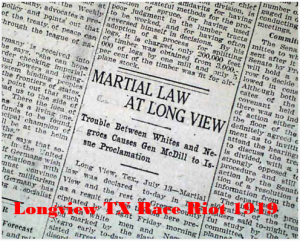 11-12 – On these days in 1919 the Longview Race Riot occurred, precipitated by an article in the July 10 issue of the Chicago Defender describing the death of a young black man, Lemuel Walters, in Longview. The article, written by Longview teacher Samuel L. Jones, reported that Walters and an unnamed white woman from Kilgore were in love and quoted her as saying they would have married if they had lived in the North. Walters, according to the article, was safely locked in the Gregg County Jail until the sheriff willingly handed him over to a white mob that murdered him on June 17. Jones was held responsible for the article, and on July 10 was accosted and beaten, supposedly by two brothers of the Kilgore woman. News of the article and of the attack on Jones inflamed tempers of both races, and on July 11, a group of twelve to fifteen angry white men drove to Jones’s house where they engaged in a gunfight with residents of the house. Some of the white men went to the fire station and rang the alarm to attract more recruits; others broke into a hardware store to get guns and ammunition. A white mob burned several black homes and a dance hall. Governor William P. Hobby sent Texas Rangers and National Guardsmen to Longview and placed the city and county under martial law. The rangers arrested seventeen white men on charges of attempted murder. Twenty-one black men were arrested, charged, and sent to Austin temporarily for their own safety. Nine white men were also charged with arson. None of the whites or blacks was ever tried. (View video report.)
11-12 – On these days in 1919 the Longview Race Riot occurred, precipitated by an article in the July 10 issue of the Chicago Defender describing the death of a young black man, Lemuel Walters, in Longview. The article, written by Longview teacher Samuel L. Jones, reported that Walters and an unnamed white woman from Kilgore were in love and quoted her as saying they would have married if they had lived in the North. Walters, according to the article, was safely locked in the Gregg County Jail until the sheriff willingly handed him over to a white mob that murdered him on June 17. Jones was held responsible for the article, and on July 10 was accosted and beaten, supposedly by two brothers of the Kilgore woman. News of the article and of the attack on Jones inflamed tempers of both races, and on July 11, a group of twelve to fifteen angry white men drove to Jones’s house where they engaged in a gunfight with residents of the house. Some of the white men went to the fire station and rang the alarm to attract more recruits; others broke into a hardware store to get guns and ammunition. A white mob burned several black homes and a dance hall. Governor William P. Hobby sent Texas Rangers and National Guardsmen to Longview and placed the city and county under martial law. The rangers arrested seventeen white men on charges of attempted murder. Twenty-one black men were arrested, charged, and sent to Austin temporarily for their own safety. Nine white men were also charged with arson. None of the whites or blacks was ever tried. (View video report.)
 12 – Texas Congresswoman, Barbara Jordan, became the first African-American to give the keynote address at a major national political convention by giving a keynote address at the Democratic National Convention on this date in 1976 in New York City. In opening her remarks, Jordan noted the significance of her appearance: “…my presence here is one additional bit of evidence that the American dream need not ever be deferred.” Jordan was a Houston native and graduate of Phillis Wheatley High School and Texas Southern University.
12 – Texas Congresswoman, Barbara Jordan, became the first African-American to give the keynote address at a major national political convention by giving a keynote address at the Democratic National Convention on this date in 1976 in New York City. In opening her remarks, Jordan noted the significance of her appearance: “…my presence here is one additional bit of evidence that the American dream need not ever be deferred.” Jordan was a Houston native and graduate of Phillis Wheatley High School and Texas Southern University.
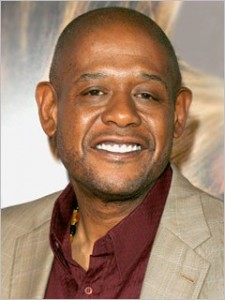 15 – Forest Whitaker, actor, producer, and director, was born on this day in 1961 in Longview. At age four, he moved with his family to Los Angeles. Whitaker was a star tackle at Palisades High School and received college football scholarship offers, however, after suffering a back injury he began to study opera and acting. In 1982, he made his film debut in the comedy Fast Times at Ridgemont High, but his breakout role came in 1988 portraying jazz legend Charlie Parker, in the Clint Eastwood film, Bird, for which Whitaker earned the Cannes Film Festival award for Best Actor and a Golden Globe nomination. His first directing effort was the film Waiting to Exhale in 1995, and in 2006 was widely lauded for his role as Ugandan dictator Idi Amin in the movie The Last King of Scotland. For that, Whitaker earned the 2007 Academy Award for Best Actor in a Leading Role, making him the fourth African-American actor to do so, joining Sidney Poitier, Denzel Washington, and Jamie Foxx. That same year, Whitaker played Dr. James Farmer Sr. in The Great Debaters, the movie about the acclaimed Wiley College debate team of the 1930s and its coach, Melvin Tolson.
15 – Forest Whitaker, actor, producer, and director, was born on this day in 1961 in Longview. At age four, he moved with his family to Los Angeles. Whitaker was a star tackle at Palisades High School and received college football scholarship offers, however, after suffering a back injury he began to study opera and acting. In 1982, he made his film debut in the comedy Fast Times at Ridgemont High, but his breakout role came in 1988 portraying jazz legend Charlie Parker, in the Clint Eastwood film, Bird, for which Whitaker earned the Cannes Film Festival award for Best Actor and a Golden Globe nomination. His first directing effort was the film Waiting to Exhale in 1995, and in 2006 was widely lauded for his role as Ugandan dictator Idi Amin in the movie The Last King of Scotland. For that, Whitaker earned the 2007 Academy Award for Best Actor in a Leading Role, making him the fourth African-American actor to do so, joining Sidney Poitier, Denzel Washington, and Jamie Foxx. That same year, Whitaker played Dr. James Farmer Sr. in The Great Debaters, the movie about the acclaimed Wiley College debate team of the 1930s and its coach, Melvin Tolson.
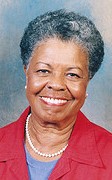 16 – On this date in 1929, Wilhelmina Delco was born in Chicago. Delco received a degree in sociology from Fisk University in Nashville in 1950 and seven years later relocated with her husband to Austin. Delco was elected to the Austin Independent School District Board of Trustees in 1968, making her the first African American elected to public office in Austin. In 1974, she won a seat in the Texas House of Representatives, making her the first African American official elected at-large in Travis County. Delco served 10 terms in the Legislature. In 1991, she was appointed Speaker Pro Tempore, becoming the first woman and the second African American to hold the second highest position in the Texas House of Representatives. She retired from the Legislature in 1995.
16 – On this date in 1929, Wilhelmina Delco was born in Chicago. Delco received a degree in sociology from Fisk University in Nashville in 1950 and seven years later relocated with her husband to Austin. Delco was elected to the Austin Independent School District Board of Trustees in 1968, making her the first African American elected to public office in Austin. In 1974, she won a seat in the Texas House of Representatives, making her the first African American official elected at-large in Travis County. Delco served 10 terms in the Legislature. In 1991, she was appointed Speaker Pro Tempore, becoming the first woman and the second African American to hold the second highest position in the Texas House of Representatives. She retired from the Legislature in 1995.
Blog: Ron Goodwin, author, PVAMU history professor
Ron Good 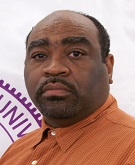 win’s bi-weekly blog appears exclusively for TIPHC/TBHPP. Goodwin is a San Antonio native and Air Force veteran. Generally, his column will address contemporary issues in the black community and how they relate to black history. He and the TIPHC/TBHPP staff welcome your comments. His latest blog is, “Independence Day.” Read it
win’s bi-weekly blog appears exclusively for TIPHC/TBHPP. Goodwin is a San Antonio native and Air Force veteran. Generally, his column will address contemporary issues in the black community and how they relate to black history. He and the TIPHC/TBHPP staff welcome your comments. His latest blog is, “Independence Day.” Read it
Submissions Wanted
Historians, scholars, students, lend us your…writings. Help us produce the most comprehensive documentation ever undertaken for the African American experience in Texas. We encourage you to contribute items about people, places, events, issues, politics/legislation, sports, entertainment, religion, etc., as general entries or essays. Our documentation is wide-ranging and diverse, and you may research and write about the subject of your interest or, to start, please consult our list of suggested biographical entries and see submission guidelines. However, all topics must be approved by TIPHC/TBHPP editors before beginning your research/writing.
We welcome your questions or comments via email or telephone – mdhurd@pvamu.edu.

